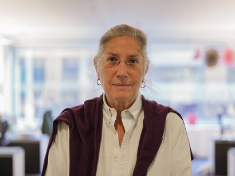-
Sue Biniaz on Getting the U.S. Back on Track for Climate Action
March 19, 2021 By Amanda King “The more the United States can get itself back on track, the better position it is in to exercise climate leadership,” says Sue Biniaz, a member of Special Presidential Envoy for Climate John Kerry’s team, in today’s Friday Podcast. Biniaz spoke about the Biden administration’s efforts to center climate change in U.S. foreign policy and national security at a recent Wilson Center event on climate security risks in the Arctic.
“The more the United States can get itself back on track, the better position it is in to exercise climate leadership,” says Sue Biniaz, a member of Special Presidential Envoy for Climate John Kerry’s team, in today’s Friday Podcast. Biniaz spoke about the Biden administration’s efforts to center climate change in U.S. foreign policy and national security at a recent Wilson Center event on climate security risks in the Arctic.“The more the United States can get itself back on track, the better position it is in to exercise climate leadership,” says Sue Biniaz, a member of Special Presidential Envoy for Climate John Kerry’s team, in today’s Friday Podcast. Biniaz spoke about the Biden administration’s efforts to center climate change in U.S. foreign policy and national security at a recent Wilson Center event on climate security risks in the Arctic.
In her remarks, Biniaz outlined four overarching themes in President Biden’s January 27th Executive Order: renewing the United States’ climate objectives; exercising U.S. climate leadership; raising global climate ambition; and putting climate at the center of U.S. foreign policy and national security.
Rejoining the Paris Agreement and re-upping the nationally determined contributions (NDCs)—country’s efforts to reduce national emissions and adapt to the impacts of climate change—are “key elements” towards getting the United States back on track for climate action. But it’s also about raising ambition. After the Paris Agreement’s focus on keeping temperature rise below 2ºC, the IPCC Special Report on Global Warming of 1.5ºC made clear the need to increase the scale and speed of climate action, says Biniaz. Because of the COVID-19 pandemic, there was no conference of the parties (COP) and countries didn’t revisit their NDCs in 2020 as planned. This creates added pressure, but also opportunity for 2021, says Biniaz, because determining a new collective temperature goal, a timeline for achieving net zero emissions, and increasing 2030 emission targets will be addressed and dealt with.
To exercise U.S. climate leadership, says Biniaz, the Biden administration is “making climate change a priority and integrating it into both bilateral diplomacy and a wide range of international fora.” This includes reconvening the Major Economies Forum—a meeting of countries that represent about 80 percent of global emissions, population, and GDP—and holding a Leaders’ Climate Summit on Earth Day, April 22, 2021.
The appointment of John Kerry as the first-ever special presidential envoy for climate is another demonstration of U.S. leadership. “Our whole team has been actively involved in climate diplomacy in the last several weeks, both to align on goals and to try to raise ambition particularly among the major economies.” Kerry has been pressing countries, at least the major economies, to commit to net zero emissions no later than 2050 and to “not only to commit to the goal but to say here’s how we intend to get there.”
In her September 2020 contribution to a Wilson Center and adelphi project, 21st Century Diplomacy: Foreign Policy is Climate Policy, Biniaz wrote, “Climate change has too many sources, on the one hand, and implications, on the other, to be either ignored or treated as a niche issue with little or no bearing on other fields.” “The Executive Order makes very clear,” Biniaz says, “climate change is at the center of foreign policy and national security.”
Friday Podcasts are also available for download on iTunes and Google Podcasts.
Sources: Intergovernmental Panel on Climate Change, United Nations Framework Convention on Climate Change, U.S. Department of State, White House.
Photo Credit: Sue Biniaz, used with permission courtesy of Sue Biniaz.
 A Publication of the Stimson Center.
A Publication of the Stimson Center.

 “The more the United States can get itself back on track, the better position it is in to exercise climate leadership,” says Sue Biniaz, a member of Special Presidential Envoy for Climate John Kerry’s team, in today’s Friday Podcast. Biniaz spoke about the Biden administration’s efforts to center climate change in U.S. foreign policy and national security at a recent
“The more the United States can get itself back on track, the better position it is in to exercise climate leadership,” says Sue Biniaz, a member of Special Presidential Envoy for Climate John Kerry’s team, in today’s Friday Podcast. Biniaz spoke about the Biden administration’s efforts to center climate change in U.S. foreign policy and national security at a recent 

